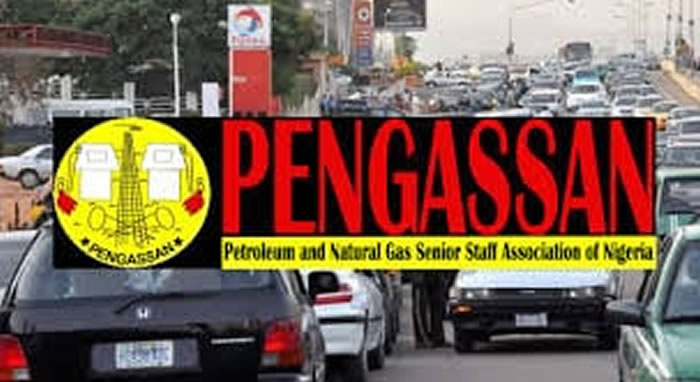The Petroleum and Natural Gas Senior Staff Association of Nigeria (PENGASSAN) has announced the suspension of gas and crude oil supply to the Dangote Petroleum Refinery, citing unresolved disputes that have strained relations between the union, government agencies, and the refinery management. The decision, revealed after an emergency meeting of the association, has raised concerns about possible disruptions in the supply of refined products across the country.
PENGASSAN, one of Nigeria’s most influential oil and gas unions, said its action followed months of unresolved grievances bordering on workers’ welfare, regulatory compliance, and operational disagreements with the refinery. The association noted that while it had engaged relevant stakeholders in dialogue, little progress was made in addressing the concerns, leaving it with no choice but to suspend supply operations.

Industry observers say the move could significantly impact the domestic fuel market, considering the refinery’s strategic role in meeting Nigeria’s petrol and diesel demand. Since its commissioning, the refinery has been seen as a cornerstone of Nigeria’s push for energy independence, with expectations that it would reduce import reliance and stabilize pump prices. But with PENGASSAN’s decision, fears of possible fuel scarcity are resurfacing, particularly in urban centers where demand pressure is already high.
Union leaders explained that their demands are not limited to the refinery alone but extend to broader issues within the oil and gas sector. They highlighted the need for improved regulatory oversight, fairness in employment practices, and protection of workers’ rights in the evolving downstream and midstream landscape. According to them, failure to address these concerns undermines not only workers’ welfare but also the sustainability of Nigeria’s oil and gas industry.
Reacting to the development, the Dangote Refinery management expressed surprise at the sudden halt in supply, stressing that it had been engaging with all relevant stakeholders to ensure smooth operations. Company officials assured Nigerians that they are in dialogue with PENGASSAN and other authorities to resolve the matter quickly. They also reaffirmed their commitment to national energy security, saying the refinery remains focused on delivering products that will ease pressure on the local economy.
Government authorities have also stepped into the fray. The Ministry of Petroleum Resources and the Nigerian National Petroleum Company Limited (NNPCL) have begun mediation efforts, urging the union to reconsider its stance in the interest of national stability. Officials emphasized that while workers’ grievances are valid, cutting off crude and gas supply to a refinery of such strategic importance could have ripple effects on the economy, inflation, and consumer welfare.
Analysts believe that the suspension could serve as a critical test for Nigeria’s industrial relations framework in the oil sector. They warn that if the standoff lingers, fuel distribution networks may come under strain, leading to scarcity and a possible spike in black-market activity. Already, reports suggest that some marketers are adopting a cautious approach, delaying bulk purchases until clarity emerges on how long the supply suspension will last.
On the global front, the situation could affect Nigeria’s crude oil positioning. With the Dangote Refinery designed to process hundreds of thousands of barrels daily, interruptions in supply could disrupt export plans and alter the balance between local consumption and foreign sales. This development may also weigh on Nigeria’s ongoing commitments under the Organization of Petroleum Exporting Countries (OPEC), where production and supply dynamics are closely monitored.
PENGASSAN, however, maintains that its action is not intended to undermine Nigeria’s energy ambitions but to secure fairness and accountability in an industry that has for decades been plagued by inefficiencies and controversies. Union leaders argue that ensuring the refinery operates under conditions that respect workers and align with global labor standards will, in the long term, benefit the country.
Meanwhile, the Nigerian Midstream and Downstream Petroleum Regulatory Authority (NMDPRA) has reassured citizens that contingency plans are in place to mitigate any immediate disruptions. Officials noted that strategic reserves and alternative supply channels are being mobilized while dialogue continues.
Despite these assurances, uncertainty remains. Consumers, who have already faced rising living costs, fear that prolonged disputes could push petrol and diesel prices upward, straining household budgets and small businesses. Transport operators, logistics firms, and manufacturers are among those most likely to be affected if supply disruptions extend.
Stakeholders are now calling for urgent compromise, stressing that cooperation among labor unions, government, and private investors is essential for Nigeria’s energy future. Some policy experts have suggested the establishment of a joint dispute-resolution framework specifically for critical national assets such as the Dangote Refinery to prevent similar crises in the future.
As discussions continue, the spotlight is firmly on whether PENGASSAN and the refinery’s management can find common ground quickly enough to avert a nationwide supply crisis. The outcome of this dispute will not only determine the short-term availability of fuel but could also shape investor confidence in Nigeria’s energy sector, which is still navigating the challenges of reforms, subsidy removal, and fluctuating foreign exchange conditions.
For now, Nigerians are left hoping that all parties will prioritize national interest and move swiftly toward a resolution that ensures stability in the country’s vital oil and gas sector.
Support InfoStride News' Credible Journalism: Only credible journalism can guarantee a fair, accountable and transparent society, including democracy and government. It involves a lot of efforts and money. We need your support. Click here to Donate
